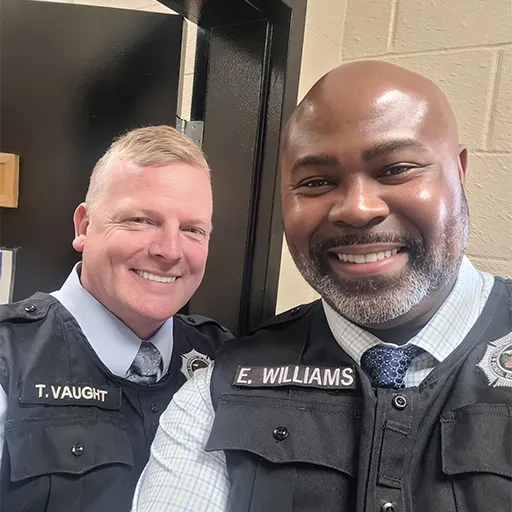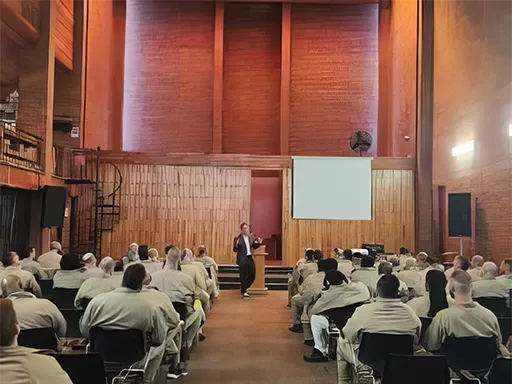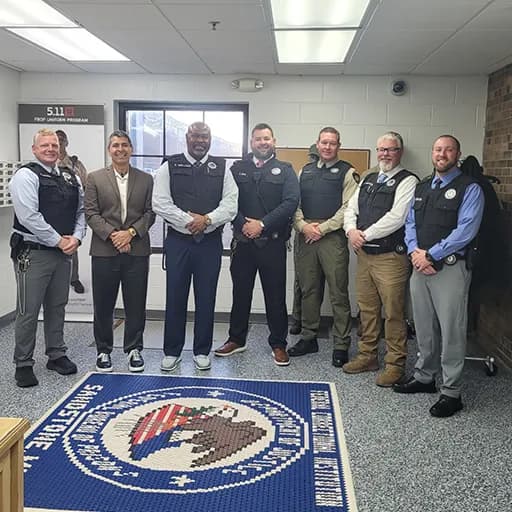
We checked out of the hotel early Friday morning to make the drive to FCI Sandstone. When I brought my luggage down at 6:15, Senior Deputy Regional Director Eric Williams already had the SUV warmed up and waiting at the curb. That consistency defined his leadership all week—quiet, steady, dependable.
As we drove through the crisp Minnesota morning, we reflected on the journey so far. The federal government remained in shutdown mode, meaning that thousands of Bureau of Prisons employees were still reporting to work without pay. Yet Eric never complained. He carried himself with the professionalism of someone deeply devoted to public service.
I told him how much I admired his work ethic and commitment. He embodied the kind of leadership that inspires others to raise their own standards—leadership rooted in consistency, humility, and excellence. The same principles I shared in every presentation resonated through his example.

A Warm Homecoming
When we pulled into the Sandstone parking lot, the warmth of the welcome was unmistakable. Staff members who worked in the firearms division came forward immediately to greet the Senior Deputy Regional Director with open arms. Earlier in his career, Eric had served as Associate Warden at FCI Sandstone, and he pointed out the house where he once lived with his family. As a good leader does, he attributed any success he had to the support that team provided him along the way.
Inside the institution, the entire executive leadership team assembled to meet us. Eric hugged them all—Warden Tim Vaught, Associate Warden Joshua Hovden, Associate Warden Christopher Davis, Executive Assistant Derek Dwyer, and Captain Ronald Warlick. He introduced me as a partner in the Bureau’s ongoing efforts to promote programs that help people prepare for success.
They invited me to stand with them for a photograph. I felt genuinely honored to be included—to be embraced as part of the team, despite being a person who had once served 26 years in federal prison. That moment underscored how much the culture of the Bureau is evolving under strong leadership—toward collaboration, inclusion, and forward progress.
Building on a Foundation of Trust
After processing through security, we walked to the Warden’s conference room to discuss the Prison Professors program and its goals. Eric endorsed our efforts enthusiastically, describing how the initiative aligns with the Bureau’s mission to encourage preparation, accountability, and rehabilitation.
Warden Vaught explained that many individuals at Sandstone had already participated in our program, Preparing for Success after Prison. He expressed interest in its evolution—especially our new profile system, which allows participants to document their progress and demonstrate why they are extraordinary and compelling.
It was rewarding to hear that our earlier visit to Sandstone had left a lasting impact. The culture of self-improvement continues to grow.

Presenting to a Motivated Population
We walked through the compound toward the chapel, where I was pleased to reconnect with Reentry Affairs Coordinator Caralee Mortenson. I had first met Ms. Mortenson years earlier during my previous visit, and I was delighted to see how she had continued to build momentum for personal development programs.
She filled the chapel with several hundred engaged men. Many carried their Prison Professors workbooks, which they asked me to sign. Their enthusiasm reminded me that the message of self-directed preparation continues to spread organically—through leadership, mentorship, and belief in the power of purpose.
I delivered two presentations that day, speaking about the strategies I used to stay focused during my own incarceration—how I worked daily to build a record that reflected my values, goals, and pursuit of excellence.
Learning from Leadership
Afterward, Warden Vaught gave me a tour of the culinary arts program at Sandstone, which he proudly described as “one of the best in the Bureau.” It was clear why. The men inside greeted me warmly, shared their projects, and served an incredible meal.
One man told me he had served nearly 20 years in custody and had recently received support from Bureau leaders in his petition for executive clemency. Hearing his story affirmed the importance of what we’re doing—helping people document their progress, build records of rehabilitation, and pursue opportunities for redemption.
I left the institution deeply inspired by the staff’s professionalism and the people’s determination to grow. Sandstone remains one of the best examples of how programs can change the culture inside a prison.
From Sandstone to Kansas City: Reflection and Renewal
We didn’t leave Sandstone until nearly 4:00 p.m. Eric and I then began the long eight-hour drive back to Kansas City. As we settled into the ride, he told me he had downloaded Good to Great by Jim Collins—the very book I had referenced throughout the week.
For years, I’ve shared how that book influenced my journey in prison and shaped the Straight-A Guide curriculum we use today. It teaches that greatness comes from disciplined people, disciplined thought, and disciplined action.
Eric smiled and told me that earlier that day, while I was speaking, he’d been on a conference call with Deputy Director Josh Smith, who had also recommended Good to Great. We spent much of the drive listening to the audiobook together, pausing often to reflect on how its lessons apply to the Bureau of Prisons today.
When Eric dropped me off at the airport hotel, it was past midnight. We had started the day at 6:00 a.m.—an 18-hour workday. Yet even after such a demanding schedule, Eric was still upbeat, composed, and focused. He never mentioned fatigue or frustration, nor the fact that he wasn’t receiving a paycheck because of the shutdown.
He is the embodiment of what Jim Collins calls an “A player”—someone who strives for excellence, no matter the circumstance. The Bureau is fortunate to have leaders like him driving its mission forward. I am grateful to have spent a week learning from his example as we advanced the advocacy efforts of Prison Professors Charitable Corporation. I am also grateful to Deputy Director Smith, Regional Director Andy Matevousian, Warden Tim Vaught, and all staff members in the Bureau of Prisons that are advancing this new leadership that Director William Marshall is setting for the agency.Live in the pursuit of excellence, and strive toward being extraordinary and compelling.

